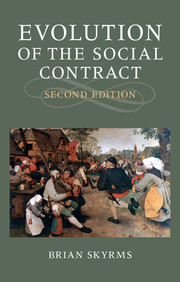1 - Sex and justice
Published online by Cambridge University Press: 05 November 2014
Summary
Some have not hesitated to attribute to men in that state of nature the concept of just and unjust, without bothering to show that they must have had such a concept, or even that it would be useful to them.
– Jean-Jacques Rousseau, A Discourse on InequalityIN 1710 there appeared in the Philosophical Transactions of the Royal Society of London a note entitled “An argument for Divine Providence, taken from the constant Regularity observ’d in the Births of both Sexes.” The author, Dr. John Arbuthnot, was identified as “Physitian in Ordinary to Her Majesty, and Fellow of the College of Physitians and the Royal Society.” Arbuthnot was not only the Queen’s physician. He had a keen enough interest in the emerging theory of probability to have translated the first textbook on probability, Christian Huygens’s De Ratiociniis in Ludo Aleae, into English – and to have extended the treatment to a few games of chance not considered by Huygens.
Arbuthnot argued that the balance between the numbers of the men and women was a mark of Divine Providence “for by this means it is provided that the Species shall never fail, since every Male shall have its Female, and of a Proportionable Age.” The argument is not simply from approximate equality of the number of sexes at birth. Arbuthnot notes that males suffer a greater mortality than females, so that exact equality of numbers at birth would lead to a deficiency of males at reproductive age. A closer look at birth statistics shows that “to repair that loss, provident Nature, by the disposal of its wise Creator, brings forth more Males than Females; and that in almost constant proportion.” Arbuthnot supports the claim with a table of christenings in London from 1629 to 1710 that shows a regular excess of males and with a calculation to show that the probability of getting such a regular excess of males by chance alone was exceedingly small.
- Type
- Chapter
- Information
- Evolution of the Social Contract , pp. 1 - 22Publisher: Cambridge University PressPrint publication year: 2014



